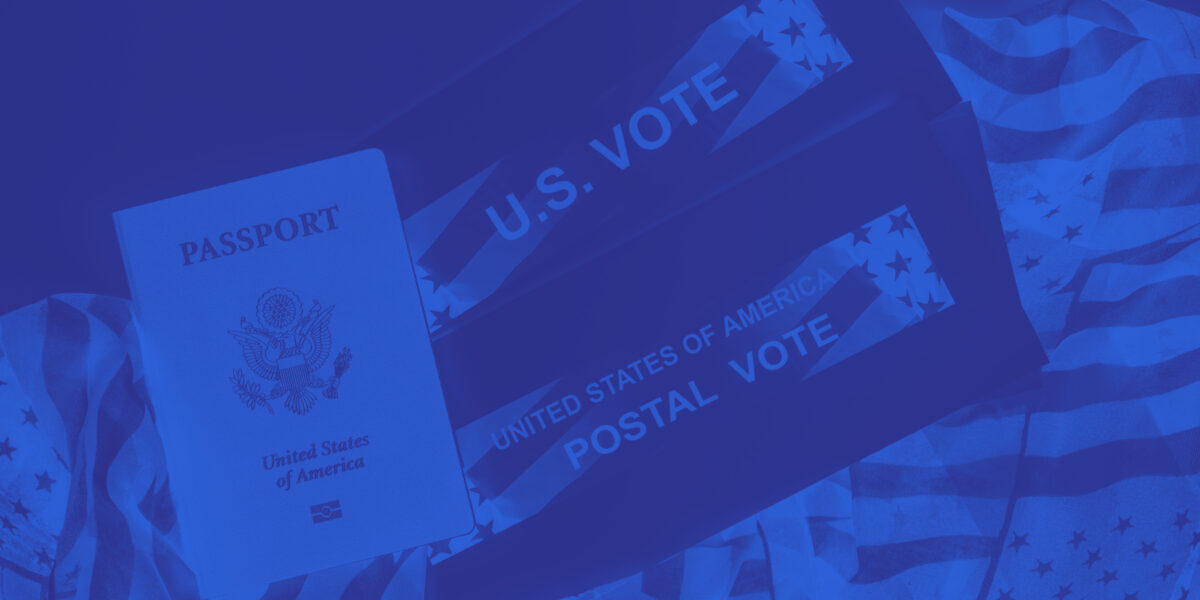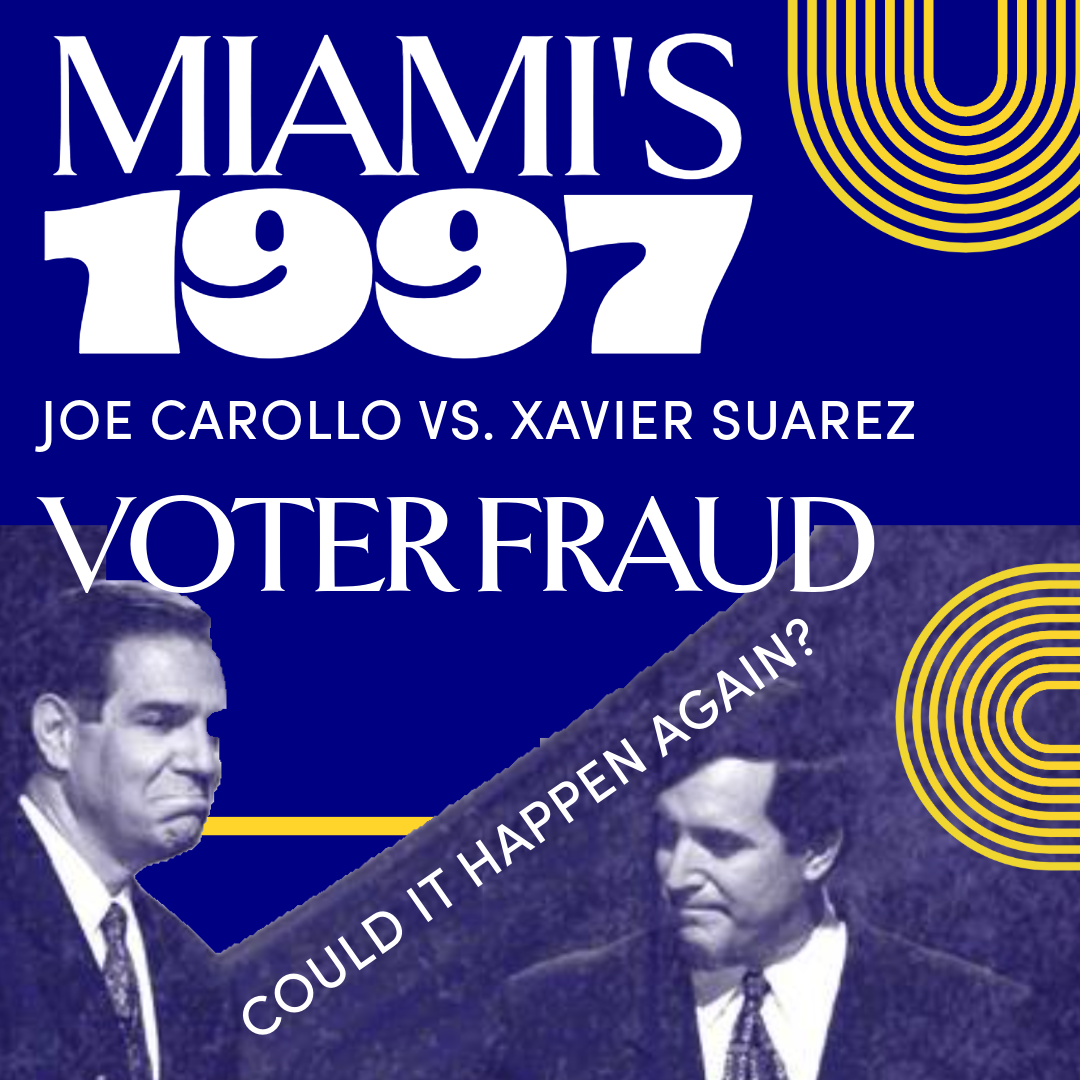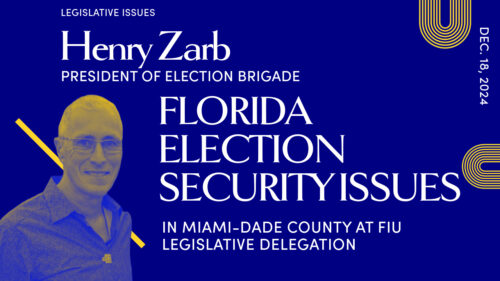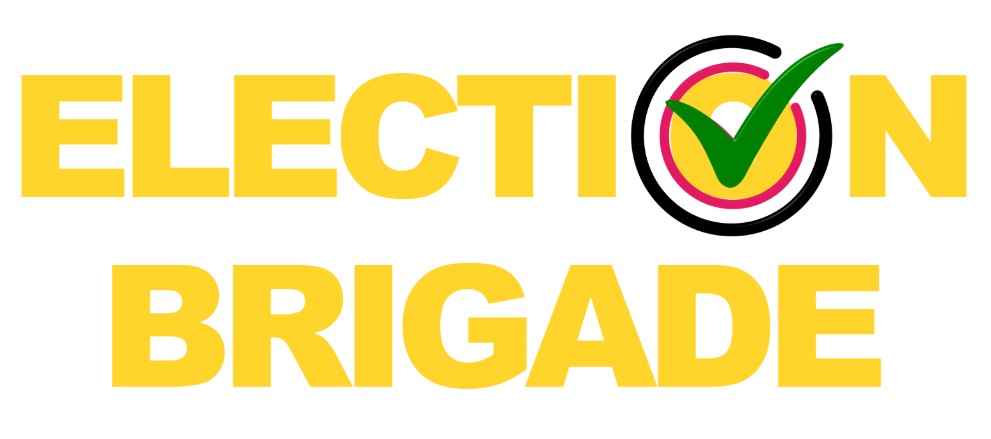June 24, 2024, America First Legal wrote a letter to The Honorable Cord Byrd, Florida Secretary of State, located at R.A. Gray Building – 500 South Bronough Street Tallahassee, FL 32399
A full letter is available for download at the end of this letter:
America First Legal Letter Written to Florida Secretary of State on June 24, 2024
June 24, 2024
The Honorable Cord Byrd
Secretary of State
R.A. Gray Building
500 South Bronough Street
Tallahassee, FL 32399
Dear Secretary Byrd:
I write to advise you about two critical tools that Congress has provided to verify the
citizenship status of individuals registered to vote in your State: 8 U.S.C. § 1373 and
8 U.S.C. § 1644. These tools, codified in federal law for decades, allow you to submit
requests for information to the Department of Homeland Security (DHS) about an
individual’s citizenship or immigration status for any lawful purpose. This includes
an inquiry where you have reason to believe that a given individual who is registered
to vote might not be a United States citizen.
Unlike the Systematic Alien Verification for Entitlements (SAVE) Program, which
requires the use of some DHS identifier to perform a search—like an Alien
Registration Number or other DHS receipt number—sections 1373 and 1644 requests
require DHS to search for specific individuals using any available information such
as a name and date of birth. Based on the information you receive in response, you
can take further steps consistent with applicable law to ensure that only U.S. citizens
remain on your voter rolls.
Congress has imposed upon DHS a mandatory obligation to respond to lawful
inquiries about an individual’s citizenship or immigration status. Should DHS refuse
or fail to provide this information, you can initiate legal action to obtain it. Given the
unprecedented levels of illegal immigration since January 20, 2021, the need for
action could not be greater, and the stakes could not be higher. If you act now, there
is likely still time to conduct legally sound voter list maintenance and remove
ineligible foreign nationals from your State’s voter rolls before the fall elections.
2
I. Federal law prohibits foreign nationals from voting or registering
to vote and imposes upon States an obligation to conduct voter list
maintenance.
As you know, only U.S. citizens can legally vote in federal elections.1 Further, it is a
federal crime for any foreign national to vote for “President, Vice President,
Presidential elector, Member of the Senate, [or] Member of the House of
Representatives.”2 It is also a federal crime for any foreign national to falsely claim
United States citizenship to register to vote.3 No foreign national is authorized to
register to vote in or to vote in federal elections, regardless of immigration status.
And there are severe immigration-related consequences for any foreign national who
attempts to vote in federal elections—namely, the foreign national becomes forever
barred from any future immigration benefit in the United States.
4
Because it is illegal for any foreign national to register to vote or to vote, there is no
reason for a foreign national to be on your voter rolls.
Accordingly, federal law requires you to remove ineligible voters from your voter rolls.
The Help America Vote Act (HAVA)
5 requires you to “perform list maintenance” of
your voter rolls,6 and to ensure that “voters … who are not eligible to vote [in federal
elections] are removed from the computerized list.”7 You must “ensure that voter
registration records in the State are accurate and are updated regularly, including
…. [a] system of file maintenance that makes a reasonable effort to remove registrants
who are ineligible to vote from the official list of eligible voters.”8 Thus, separate from
any independent State law obligations you may have, these black-letter federal
statutory requirements logically and necessarily authorize States to ensure the
removal of foreign nationals from their voter rolls.
1 See, e.g., National Voter Registration Act, P.L. 103-31, 107 Stat. 77 (1993) (requiring the federal voter
registration form to contain the question “Are you a citizen of the United States of America?”).
2 18 U.S.C. § 611 (criminal statute subjecting aliens who vote in federal elections to up to one year in
prison or a criminal fine).
3 E.g. 18 U.S.C. § 911 (“Whoever falsely and willfully represents himself to be a citizen of the United
States shall be fined under this title or imprisoned not more than three years, or both.”); 18 U.S.C. §
1015(f) (knowingly making “any false statement or claim that he is a citizen of the United States in
order to register to vote or to vote in any Federal, State, or local election” subjects an alien to five years’
imprisonment or fine); 52 U.S.C. § 21144(b) (making it a crime to “knowingly commit[] fraud or
knowingly make[] a false statement with respect to the naturalization, citizenry, or alien registry” in
connection with voter registration and voting).
4 See 8 U.S.C. § 1182(a)(6)(C)(ii)(I) (making ineligible for a visa and inadmissible into the United States
“[a]ny alien who falsely represents, or has falsely represented, himself or herself to be a citizen of the
United States for any purpose or benefit … any … Federal or State law”).
5 P.L. 107-252, 116 Stat. 1666 (2002).
6 52 U.S.C. § 21083(a)(2)(A).
7 52 U.S.C. § 21083(a)(2)(B)(ii).
8 52 U.S.C. § 21083(a)(4)(A).
3
II. Even though the Supreme Court held that States cannot impose
additional requirements for voters registering using the federal
form, States are still required to conduct list maintenance and
remove foreign nationals from voter rolls.
HAVA established the U.S. Election Assistance Commission (EAC), which is
responsible for setting the requirements for registering to vote using the federal form.
Unfortunately, the form promulgated by the EAC does not expressly require
applicants to submit documentary proof of citizenship. Instead, it merely requires
voter registrants to sign a form “under penalty of perjury,” swearing or affirming that
“I am a United States citizen.”9
The form also warns that providing false information may lead to legal consequences,
including fines, imprisonment, and, in circumstances involving foreign nationals who
register to vote, removal from the United States and other potential immigration
enforcement consequences.10
Because the National Voter Registration Act (NVRA) requires that States must
“accept and use”11 the form created by the EAC,12 and because that form does not
explicitly require documentary proof of citizenship, the Supreme Court held in
Arizona v. Inter Tribal Council of Arizona, Inc.13 that “the NVRA forbids States to
demand that an applicant submit additional information beyond that required by the
Federal Form.”14 However, the Court also held that the NVRA “does not preclude
States from denying registration based on information in their possession establishing
the applicant’s ineligibility.”15 Further, the Court noted that the NVRA only requires
9 Register to Vote in your State by Using this Postcard Form and Guide, U.S. ELECTION ASSISTANCE
COMMISSION (available at https://tinyurl.com/4wj6vm6r) (located in Box 9 on the fourth page of the
document; the page is titled “Voter Registration Application”).
10 Id. The form’s actual language states that an individual who provides false information on the form
can be “fned [sic], imprisoned, or,” for aliens, “deported from or refused entry to the United States.”
11 52 U.S.C. § 20505(a)(1).
12 The NVRA originally delegated this authority to the Federal Election Commission. NATIONAL VOTER
REGISTRATION ACT OF 1993, PL 103–31, May 20, 1993, 107 Stat 77 § 6(a)(1). HAVA transferred this
authority to the EAC.
13 570 U.S. 1 (2013).
14 Id. at 15. While this was the Court’s core holding, this remains a highly questionable position in
light of the fact that the form is silent on the issue of requiring documentation in support of citizenship.
15 Id. (cleaned up) (emphasis added).
4
states to register eligible persons.16 Nor does the Court’s decision prohibit States from
engaging in the voter list maintenance procedures required by HAVA,17 such as
inquiring about the citizenship or immigration status of potentially ineligible voters
on voter rolls.
Further, despite its prohibition on requiring evidence of citizenship status beyond the
four corners of EAC’s federal voter registration form, the Court acknowledged that
States nevertheless could access information via other means to help them resolve
questions about a voter registration applicant’s citizenship status.18
Additionally, the NVRA provides voters a private right of action to ensure that the
voter rolls are maintained.19 An individual or organization aggrieved by an NVRA
violation may seek declaratory or injunctive relief in federal district court against the
state’s chief election official for failure to systematically remove ineligible voters from
state voter rolls.20
III. The DHS SAVE has a design flaw and does not fully solve the
critical problem of foreign nationals voting in federal elections.
DHS’s U.S. Citizenship and Immigration Services (USCIS) makes available to the
States a system for verifying the immigration status of foreign nationals: the SAVE
program. Five States have already executed memoranda of understanding with
USCIS to use SAVE to verify the citizenship status of applicants for voter
registration.21
However, SAVE is hobbled by a critical design flaw: The system requires at least one
of the following specific “numeric identifier[s]”: “Alien / USCIS Number (A-Number),”
“Form I-94, Arrival/Departure Record Number,” “Student and Exchange Visitor
Information System (SEVIS) ID number,” “Naturalization / Citizenship Certificate
Number,” “Card / I-797 Receipt Number,” “Visa Number,” or “Foreign Passport
Number (if entered along with a U.S. immigration enumerator).”22 As one federal
judge recently observed, “the [EAC’s] Federal Form does not include a space for
registrants to provide this information” about “immigration numbers.”23
16 Id. “… §1973gg–6(a)(1)(B) only requires a State to register an “eligible applicant” who submits a
timely Federal Form. (Emphasis added.)”
17 52 U.S.C. § 21083(a)(2)(A), (a)(2)(B)(ii), (a)(4)(A).
18 Arizona does not speak to the verification requirements established in either HAVA or the REAL ID
Act. Indeed, Arizona neither cites nor mentions either of these two Acts of Congress in its decision.
19 Dobrovolny v. Nebraska, 100 F.Supp.2d 1012 (2000).
20 52 U.S.C. § 20510.
21 SAVE Agency Search Tool, UNITED STATES CITIZENSHIP AND IMMIGRATION SERVICES,
https://tinyurl.com/yc8d7jf4 (last visited June 17, 2024). The five States are Arizona, Colorado, Florida,
Georgia, and Virginia.
22 Tutorial: Introduction to SAVE and the Verification Process for SAVE Users, DEP’T OF HOMELAND
SEC. ET AL (Mar. 2024) (available at https://tinyurl.com/msek795k).
23 Mi Familia Vota v. Fontes, — F.Supp.3d —-, 2024 WL 862406, at *6 (D. Ariz. 2024).
5
Furthermore, SAVE does not process social security or driver’s license numbers,
which are the ID numbers that State and local officials are most likely to have at
their disposal.
Thus, in practice, SAVE is practically useless for verifying the citizenship of voter
registrants. It can only be of value when a State has the specific numeric identifiers
that are the searchable variables in SAVE. Most States would not have access to these
identifiers, in part because none of these identifiers are required under the current
version of the EAC federal voter registration form. States cannot use the most readily
available identifiers they have in their possession, including social security and
driver’s license numbers.
IV. Solution: States should submit requests to DHS to verify the
citizenship or immigration status of registered voters on voter
rolls—and DHS has a legal obligation to provide such information.
Fortunately, States have an alternative solution to obtain information about
individuals on their voter rolls. And they can do so without the need for a specific
identifier required by the SAVE system.
The Immigration and Nationality Act (INA), at 8 U.S.C. § 1373, requires DHS to
“respond to an inquiry by a Federal, State, or local government agency, seeking to
verify or ascertain the citizenship or immigration status of any individual within the
jurisdiction of the agency for any purpose authorized by law, by providing the
requested verification or status information.”24 The INA also states, in 8 U.S.C. §
1644, that “[n]otwithstanding any other provision of Federal, State, or local law, no
State or local government entity may be prohibited, or in any way restricted, from
sending to or receiving from … [DHS] information regarding the immigration status,
lawful or unlawful, of an alien in the United States.”25
As explained above, federal law unambiguously requires that voters in federal
elections be United States citizens and prohibits all foreign nationals, even those who
are lawfully present in the United States, from registering to vote or voting. Federal
law also imposes on States the duty of ensuring that ineligible voters are removed
from voter rolls.26 Also, many States impose citizenship requirements under State
law, and 8 U.S.C. § 1644 confers on States unrestricted authority to obtain
information about the immigration status of aliens in the United States. Therefore,
it is a “purpose authorized by law” under 8 U.S.C. § 1373(c) for a State to ask DHS
about the citizenship status of presently registered voters.
24 8 U.S.C. § 1373(c) (emphasis added).
25 8 U.S.C. § 1644.
26 52 U.S.C. § 21083(a)(2)(A), (a)(2)(B)(ii), (a)(4)(A).
6
Plainly, State and local election officials have the authority and duty under federal
law to obtain citizenship information about registered voters. Because SAVE cannot
provide that information, State and local election officials have the authority under
federal law to request that information directly from DHS.
Even if SAVE did accept inquiries without numeric identifiers, States would still
have the authority to make direct requests to DHS because SAVE charges a fee per
query: “$1 per case in FY 2024,” and that fee will “incrementally increase to $3.10 by
FY 2028,”27 but Sections 1373 and 1644 do not authorize DHS charging fees for
inquiries under those sections. Indeed, such fees arguably represent an illegal
obstacle to States with a clear statutory right to citizenship status information in the
federal government’s possession.
Notably, DHS already can verify an individual’s citizenship without a numeric
identifier. For example, DHS maintains the Person Centric Query System (PCQS)
database. It allows agency employees to look up individuals and quickly and easily
verify their citizenship status using only a name and date of birth.28 This means that,
right now, DHS can answer all inquiries from State and local elections officials about
the citizenship status of all presently registered voters and all persons attempting to
register to vote and do so at no cost to the States. State and local election officials
already have the authority to submit citizenship inquiries about registered voters to
DHS, and they can demand immediate responses from DHS.
Of course, DHS does not maintain a list of all United States citizens, just those
individuals it has encountered through one of its immigration agencies. Accordingly,
the absence of information in DHS’s databases is insufficient evidence in and of itself
to remove an individual from a State’s voter rolls. However, an affirmative match
with an individual who has not become a naturalized citizen would likely provide
sufficient grounds for further inquiry and, in most cases, eventual removal from voter
rolls. It may be that some individuals subject to such a query could have subsequently
naturalized and would, therefore, not be subject to removal from a State’s voter rolls,
but PCQS should also contain that naturalization information.
Thus, whenever a foreign national is listed in PCQS without any accompanying
naturalization information, there would be reasonable grounds to conduct further
27 SAVE Transaction Charges, U.S. CITIZENSHIP AND IMMIGR. SERVS, (July 20, 2023),
https://tinyurl.com/yszvcy3s.
28 Privacy Impact Assessment Update for the USCIS Person Centric Query Service Supporting
Immigration Status Verifiers of the USCIS Enterprise Service Directorate/Verification Division, DEP’T
OF HOMELAND SEC. (June 8, 2011), https://tinyurl.com/8c34jpad. (“Status verifiers may conduct queries
based on an individual’s name and date of birth.”); DEP’T OF STATE, Foreign Affairs Manual, 9 FAM
202.2-5(C)(c) (instruction to consular officers about using PCQS stating that “[y]ou can review the
applicant’s information by … entering the name and date of birth of the individual”).
7
inquiry of the individual in question to determine whether they should be removed
from the State’s list of eligible voters.29
Because this system of verification relies on information in DHS’s databases, it
necessarily would not be able to provide information about aliens in the United States
who have evaded detection. However, using these tools provides you with the ability
to remove countless ineligible voters from your voter rolls if they were, in fact,
encountered by DHS and have not naturalized.
If DHS fails to respond to an inquiry, you can sue in federal court to obtain the
necessary information that Congress has required DHS to provide.30
V. Conclusion
You have the unique authority and ability to remove foreign nationals from your voter
rolls. Congress has provided you with a valuable tool to facilitate your ability to do
so. Given widespread public concern over the presence of foreign nationals on voter
rolls in jurisdictions across the United States and unprecedented levels of illegal
immigration across our southern border since January 20, 2021, the time to act is
now.
Best regards,
/s/ Gene Hamilton
Gene Hamilton
Executive Director
America First Legal Foundation
Cc: Governor Ron DeSantis
Download PDF of America First Legal Letter To Cord Byrd
View Election Brigade of Miami Dade County Response To The America First Legal Letter





